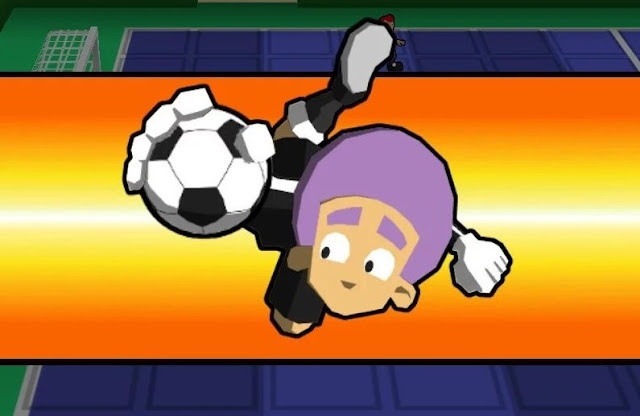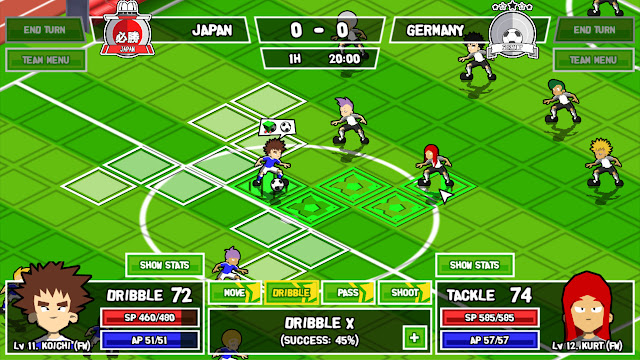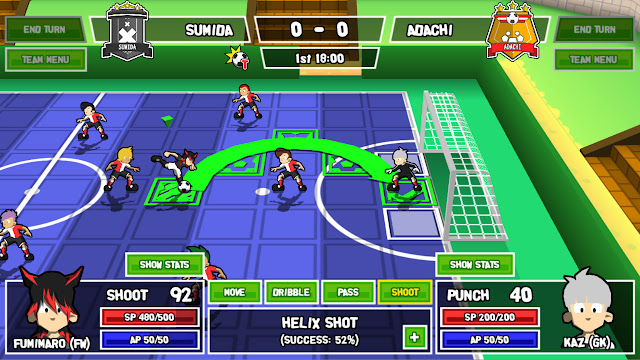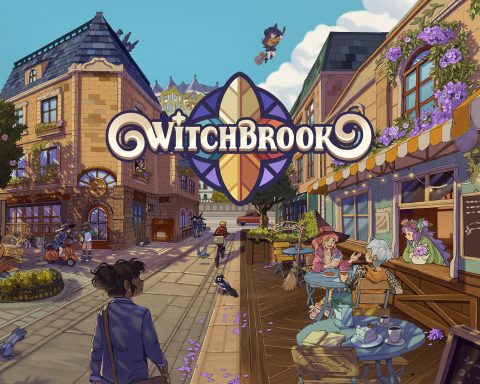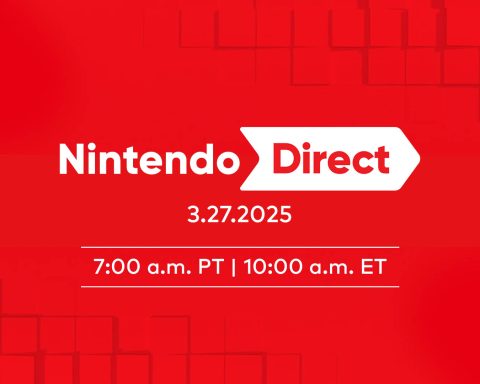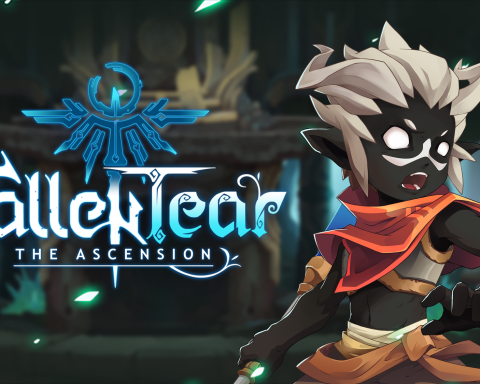Review by Matt S.
Football (yes, yes, “soccer” in some parts) is a highly tactical sport. Sure, players don’t run around in turn-based fashion, but the ebb and flow of a match, and the way that each player has their defined role and ability set… well, it’s all downright Final Fantasy Tactics, innit? Ganbare! Super Strikers recognises that and in the process gives us a pretty effective, albeit no-frills, sports/tactics hybrid.
Developed by an Australian (local devs represent!), Ganbare! Super Strikers has a lot going for it. The game splits the football field into a tactics-like grid, and then gives you six players (and one goalie) on each side to control in a turn based fashion. Instead of attacking enemies to kill them, as in a standard tactics JRPG, you’re looking to use special abilities to knock players out, freeze them temporarily, and put them to sleep, so that you have a clear pathway to the goal. Then, after your turn, a “minute” on the clock counts down, and the other team get their turn.
Ganbare! Super Strikers gets a lot right. Mechanically, it’s balanced brilliantly, with plenty of special abilities to learn and a good tension between attack and defence. Assuming that your team is about the same level as the opponent’s (more on that shortly), you’ll feel like you do genuinely need to be tactical, because the opponent will effectively harass your players into losing the ball and getting themselves knocked out. It’s also visually entertaining, with chunky character models and slick little cut scenes every time a special attack is let loose.
Sadly, outside of the core mechanics, Ganbare! Super Strikers is sadly far too limited for its own good. While the pitch action feels nice, off the pitch all you can do is equip your players and start the next match. There’s no effort at narrative or storytelling, and there’s no effort to encourage you to care about your players or team. There’s no consequence for losing – just play again, and conversely victory feels hollow, since there was nothing substantial at stake and all a victory does is unlock a tougher match. Super Strikers didn’t need an epic JRPG plot to work, but it needed some kind of context to make you care.
While there are a fair few matches to play through, and there are a lot of hours of raw play in Super Strikers, it’s executed in the most irritating way. Each match win rewards you with up to three stars. Simply winning is enough for one star, but then you’ll also need to complete optional objectives (such as using certain abilities, getting certain scores, and so on) in order to earn the other stars. This comes directly from mobile gaming, where the goal is to have you play on forever, and replaying levels to earn new starts adds to the play count. It’s also such a dull, arbitrary way to encourage replay value.
For Super Strikers the issue is made worse by the fact that the good equipment – which you need to give your players new abilities – is locked behind those stars, and the difficulty level escalates fast enough that if you’re not getting the full 3-star ratings in each match before moving on to the next one, you’re going to come up hard against a wall of difficulty quickly. Characters level up in an RPG-like fashion between matches, and each new team you face comes with a significant jump in its level. Irritatingly, you can’t even pull up the experience level of opposition teams or their players to tell if you’ve got any hope of winning the match before going in.
The fundamental, core game in Ganbare! Super Strikers is genuinely sound. It’s easy to pick up and play, and the tactics are clean and minimalist – really it’s about having good spatial awareness, an understanding of how to move your “pieces” around, and an understanding of how to manage player’s fitness and “ability points” so that you’re not scrambling with an exhausted team at the end. It really feels very much like a board game, in which simple strategies and a bit of luck will determine the winner, and it’s flexible enough with its systems that there are a couple of different ways you could approach the game. Sadly, with no multiplayer, you’re locked into battle with AI which, while competent enough, is very repetitive and uninspired.
Ganbare! Super Strikers is simply let down by the limitations of being a micro-indie game. It has a host of good ideas, and the action on the pitch is fine. It’s laudable that, as a tiny indie production, the developer decided to get that right so that the game plays nicely, before worrying about anything else. Sadly, that “anything else” is also what elevates a game. Getting the core mechanics right is expected. Giving players a reason to care and to want to continue playing on is where success comes from and so, while I admire the Aussie spirit in taking on something this ambitious, it really is a game that could have done with a lot more resourcing.
– Matt S.
Editor-in-Chief
Find me on Twitter: @mattsainsb

